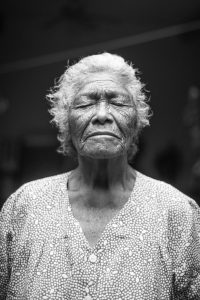By Okere Sonia
One of the major dreams of every young girl is to meet her prince charming, get married, and live happily ever after. However, unplanned events, such as death, can shatter those dreams.
For a very long time, most Nigerian widows have been experiencing injustice, which is often kept hidden from the public.
There are many terrifying stories of how they were tortured, starved, kicked out of their matrimonial homes, and disinherited. In today’s article, we will bring to light some of the barbaric cultures that promote the maltreatment of widows in Nigeria.
During this research, I spoke with some widows who were willing to share their experiences. The first story is about Mrs. Evelyn. After losing her husband, her in-laws collected everything the couple had acquired.
“After I married my heartthrob, we moved to Lagos and started hustling for greener pastures. He was very poor when we met, but God blessed his motor spare parts business over time. So that was how we moved from lack to abundance. We acquired many property and established other businesses. Everything went very well until that fateful day when my husband died in a car accident.
As soon as his family members heard the news, they barged into our house and started scrambling for their late brother’s property. They searched the rooms and took all the documents, cars, and keys to our stores. After collecting everything, they still accused me of being responsible for his death.
I was not involved in his burial preparations, and after they had fixed a date, they invited me to the family house for a meeting. When I got there, they started questioning me. They wanted to know if there were still some property that I was hiding from them. I insisted that they had collected everything, yet they were not satisfied. At a point, I started crying, and instead of consoling me, they said I was shedding crocodile tears.
They accused me of belonging to a secret cult and asked me to drink the bath water of the corpse. Of course, I accepted it even when I knew it was unhealthy. After the burial, I took my children back to the city and started a new life. Unfortunately, we had no money or inheritance. So I had to start from scratch again. However, I’m grateful to some of my late husband’s friends who assisted me in establishing a new business. Many years have passed since that incident, and my in-laws have never asked after their late brother’s children.
I heard that most of the property they snatched from me was sold, and they squandered all the money. The only remaining property is the house in the village, and my children insist that they would surely recover it from their uncles. Meanwhile, I don’t want them to ever return to their hometown because I am afraid that their uncles might harm them.”
In the case of Mrs. Benedicta Oguntade, after she was accused of killing her husband, her in-laws insisted that she should sleep in the same room with his corpse before the burial.
As part of their tradition, they also asked her to cook a meal, which would be displayed outside throughout the night. The people of that community believe that if the food disappears by morning, that means her late husband ate it; if it doesn’t, then she is guilty of killing her husband.
Although Benedicta didn’t believe in the tradition, she cooked the food and kept it outside overnight. Luckily, by morning, it had vanished. She said she wondered who took the food. Of course, it could’ve been anyone, but definitely not her husband’s ghost. Did you know that her in-laws continued to hurt her and her children even after she was proven innocent? They took all her husband’s property and deprived her children of their rights. It was really a painful experience.
What are widowhood rites?

These are practices/rituals that a married woman is expected to perform after the death of her husband. It varies by culture, but it usually includes some combination of mourning, feasting, and cleansing. Some of these rites are very simple and require the widow to sit in her home for several days. During this time, she is not allowed to leave the house, speak to anyone outside her family, or eat certain foods.
Other rites are more complex and may involve a period of mourning that can last for weeks, months, or even years. Below are examples of widowhood rites performed in different cultures:
In some communities in Igbo land, the widow is expected to wail loudly, fling her arms around, fall on the floor, and then get up to repeat the cycle over and over again. This bitter wailing must continue for four days or one month. Sometimes, she is forced to lie close to the corpse before the day of the burial.
In some locations, the widow is forced to dress almost naked and sit on fresh leaves or bare ground for days. Then, if an ant bites her, that “proves” she killed her husband.
In some cultures, the widow is not allowed to wear fanciful ornaments or perfumes during the period of mourning. She has to wear white, black, or special clothing. Sometimes, her hair is shaved with razor blades or broken bottles.
In other locations, some widows are forced to work on the farms of their brothers-in-law without being paid. They do all the domestic chores and sleep outside the house at night. They are also not allowed to eat from the main pot of food.
The Ritual of Drinking the Bathwater of the Corpse
As we mentioned earlier, in some cultures, the widows are expected to drink the bath water of their late husband’s corpse. Sometimes, before she drinks it, she may wash her hands and face in it. She may also sprinkle it on her head and chest. And after drinking it, she often pours the leftovers on her husband’s grave.
Everyone knows that such water contains impurities that are harmful to our health. However, some widows believe this ritual binds them to the spirit of the deceased. It can also serve as a means of saying goodbye to the dead.
In Igbo land, it is believed that if the woman had a hand in the death of her husband, she would experience bad luck after drinking the bath water. This practice is not universal, and its specific reasons may vary depending on the culture and individual circumstances. What happens to those who refuse to perform the ritual? In some cultures, they are often humiliated, disinherited, ostracized, or even killed.
While pondering the adverse effects of such practices, I read about another weird incident that occurred in Gokwe area of Zimbabwe. According to the news, Sarah Simirayi married a man from Nemangwe village named Nunurayi Musamo. After being together for a while, she jilted him and went to live with her lover. While she was away, her estranged husband refused to marry another woman. He always professed his undying love for her and prayed for her to return.
Some years later, Sarah’s lover chased her away, and she had to return to her first husband. Unfortunately, he was already sick and bedridden when she arrived. Then, a few weeks later, he died. While preparing for the burial, Sarah’s in-laws found a note in the dead man’s wardrobe.
It was not opened until the day of the burial. So on that day, while the corpse was lying in state, they opened the letter and read it to everyone. The dead man stated that he fell sick because Sarah had abandoned him. Then he went further to make a silly request. Can you guess what it was? He wanted his wife to have sex with his corpse; otherwise, his soul might never find rest on the other side. Everyone was shocked at his demand, yet they asked Sarah to fulfill the dead man’s last wish.
When she refused, they forced her to do it. The most annoying part of the story is that she climbed into the coffin, removed her underwear, and had intercourse with the corpse while most of the guests were watching and laughing. Now let me ask a question. Do you think Sarah’s mental health will ever remain the same after that incident?
Levirate Marriage
This is a marriage between a widow and her late husband’s brother. This tradition encourages the brother-in-law to inherit his late brother’s wife, children, and property. It doesn’t matter if he already has a wife, and in most cases, the levir doesn’t cater to the needs of the widow and her children. He only uses her as a sexual object.
“After my husband died, his family wanted me to marry one of his brothers. Even before he was buried, they had started making sexual advances at me. I rejected all of them because I couldn’t betray the love I have for my late husband. One day, they summoned a meeting and shared my children amongst themselves. Then they threatened me to leave their family empty handed because I refused to abide by their tradition.”
In some rural communities in Kenya (e.g., Luo), a widow is considered unclean. Therefore, she must undergo some spiritual cleansing rituals before remarrying. They believe any man who marries a widow who didn’t perform the ritual would die mysteriously. Such rituals might seem a bit strange to an outsider, but to the people, it is a very sacred tradition that has been passed down for centuries.
What are the consequences of maltreating widows in our society?

What happens when a man loses his wife? Does he go through the same maltreatment meted on widows? The answer is no. Most times, the experience leaves a negative impact on the widow’s self-esteem and mental health. She may also experience physical and emotional pain.
In cases where the victims were ostracized, it becomes difficult for them to get support and resources, such as financial assistance, healthcare, and legal services. Sadly, some widows have died or committed suicide when they couldn’t bear it anymore.
The maltreatment of widows can also lead to a breakdown of social bonds and trust in the family. The women are likely to become less productive, and their children may not receive the best care. All these could lead to an increase in poverty and crime rates in our society.
General Ways to Eradicate Violence against Widows

There are many non-governmental organizations (NGOs) in Nigeria banding together to put a stop to widows’ maltreatment. These dedicated souls work tirelessly to raise awareness of the plight of widows and solicit better legal protection against abuse.
In addition, they are also involved in community education programs. However, don’t be fooled because these small battles won’t be enough until we win the war against cultural stereotypes, poverty, and gender discrimination.
Everyone has a role to play in this fight to end the discrimination and maltreatment of widows in Nigeria. First, the government should enact a functional Widows’ Protection Act that will ban all forms of widowhood rites, and those who fail to abide by the law should be punished severely.
Since these practices are common in rural areas, traditional rulers and chiefs must stand up against them and ensure that the widows in their communities are protected. We also need to organize more awareness campaigns to educate the public on basic human rights and the legal protection available for widows. I believe when people are informed about the consequences of violating the law, they will refrain from taking advantage of the vulnerable widows around them.


